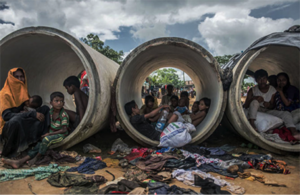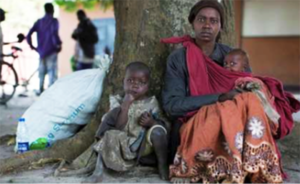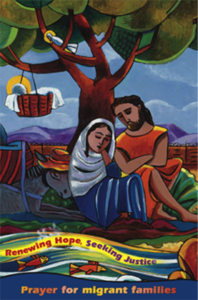December, 2017 Reflection
December 1, 2017Forced to Seek Safety in a Foreign Land: The Plight of Those on the Move
By Jean Schafer SDS

Holy Family: https://www.pinterest.com/pin/56083957838407207/
As we think of the Holy Family during the Advent/Christmas season, we often forget their need to flee their homeland shortly after the birth of their child, Jesus, because of a very jealous King Herod. Herod was considered an acceptable leader of his day: bringing Judea into the Roman Empire; copying the architecture and political styles of Greece; stabilizing the economy; reducing taxes; building trade; building the port city of Caesarea and that of Samaria. Yet, in jealousy, Herod had already killed his wife and two of his three sons. His brother narrowly escaped the same fate. Herod feared the announcement of a newly-born ‘King Jesus,’ as a threat to his power and position. This threat he determined had to be eliminated. What followed was the slaughter of Holy Innocents!
“When the magi had departed, behold, the angel of the Lord appeared to Joseph in a dream and said, ‘Rise, take the child and his mother, flee to Egypt, and stay there until I tell you. Herod is going to search for the child to destroy him.’ Joseph rose and took the child and his mother by night and departed for Egypt. He stayed there until the death of Herod, that what the Lord had said through the prophet might be fulfilled, ‘Out of Egypt I called my son.’
“When Herod realized that he had been deceived by the magi, he became furious. He ordered the massacre of all the boys in Bethlehem and its vicinity two years old and under, in accordance with the time he had ascertained from the magi. Then was fulfilled what had been said through Jeremiah the prophet: ‘A voice was heard in Ramah, sobbing and loud lamentation; Rachel weeping for her children, and she would not be consoled, since they were no more.’” Matt. 2: 13-18
Today people continue to flee political repression and open conflict. Studies show our world is witnessing the highest levels of human displacement on record: •1,200 people are forcibly displaced per hour per day; • 65.6 million have been forced from their homes; • 22.5 million are refugees (half under the age of 18) with 55% from the countries of Syria, Afghanistan, and South Sudan; • 10 million people are stateless and have been denied a nationality; * 460,000 live in the dangerous Dadaab refugee camp in Kenya, the largest in the world; • 1.3 million Rohingya Muslims, a stateless people, are fleeing repression in majority-Buddhist Myanmar. Since August 2017 600,000 have arrived on foot and in boats into Bangladesh at a rate of 20,000 a day.
| “For 4 days, I hid myself in the forest. Then, we tried to walk to the border. I was so scared,” says Rajida Begum, a 30-year-old mother who fled her village with neighbors when she was 9 months pregnant. She gave birth to a baby girl under a piece of plastic sheeting in the middle of a rice paddy 5 days after arriving in Bangladesh. As she cradled her newborn baby, she looked relieved: “When I saw that she was healthy, I was so happy. I gave thanks to God.” |
Abdul Rahman, 21, who lost his wife – shot by the Burmese army, now is the sole caregiver for his 4-month-old daughter. “The baby won’t stop crying. I’m asking lactating mothers to help with feeding her, but I’m so worried. I don’t know if she will survive. We have no food. We have nothing at all,” he said. |
Refugees are men, women and children fleeing war, persecution and political upheaval who have been forced to cross borders to seek safety in another country. Most eventually go home when it is safe (as did the Holy Family); some stay in temporary refugee settlements; and a tiny fraction resettle in a third country, such as the U.S.
Refugees face innumerable dangers as they travel and as they attempt to find a place to live until they can return home. According to the United Nations, human trafficking and the exploitation by criminal gangs are intimately linked to the plight of vulnerable people running from political conflicts. While trafficking for sexual exploitation might be the first type of trafficking people think of, trafficking actually takes diverse forms in conflict situations. Children suffer a high percentage of the abuse, both in sexual exploitation and in labor-related settings.

Rohingya Refugees in Makeshift Shelters in Bangladesh http://www.crs.org/
Let us reflect on some of the contemporary situations of our refugee brothers and sisters, fleeing in fear, as did the Holy Family:
- The Islamic State conflict has increased the vulnerability of groups like the Yazidi and the Kurds. Yazidi women are forced into what is called chattel slavery. They are bought and sold as property; forced to act as domestic servants, sex slaves, or wives of militants. Yazidi men and boys are forced to become militants and even suicide bombers. Now girls from the West are lured into ISIL-controlled territory by ‘boy friends,’ using methods similar to those used by online traffickers.
- The Syrian conflict has produced thousands of refugees. Trafficked Syrian children are forced to work excessively long hours in abusive situations or are held for ransom until their families pay to have them released.
- Boko Haram in West Africa enslaves people in areas they control. Women and girls are forced to marry militants, while boys are forced to become suicide bombers. Children are forced to beg in order to raise funds for the Boko Haram forces.

http://www.unhcr.org/en-us/figures-at-a-glance.html
- Congolese militias in the Democratic Republic of Congo force artisanal miners to search for tantalum, gold, diamonds, tin, and other minerals to make money to support the war effort. Children are trafficked and indoctrinated into the militias. A U.N. University report estimates that there are around 30,000 child soldiers in the DRC.
- Criminal gangs operating in the refugee camps at Calais and Dunkirk, France have sexually exploited youth traveling alone or forced them to commit crimes in exchange for transportation to the UK. Many children are forced to work along the migration route to finance their journey north.
- The Balkan Route—popular with Syrian, Iraqi, and Afghan refugees—runs from Turkey into Greece, Bulgaria, and north toward Germany. Children along the route were not only assaulted but also illegally and forcefully deported after they were arrested. Of the children treated by Doctors Without Borders, just over 75% were assaulted by either Serbian state police or border force officials, while 8% were hurt by traffickers. Most had visible signs of mistreatment, including knife and razor blade cuts, scars from severe beatings, and symptoms of dehydration and food deprivation.
- Italian authorities discovered an organ trafficking ring involving traffickers from Libya and Eritrea, who charged migrants an up-front fee to get them from Africa to Italy. If migrants could not immediately pay the fee, they were given the option to pay once they arrived in Italy. Upon arrival, however, they were either exploited for forced labor, or their organs were harvested and then trafficked elsewhere.
Pope Francis Calls on People of Good Faith Are Called to Respond:
Pope Francis has spoken often on behalf of vulnerable migrants and refugees:
“It is necessary to respond to the globalization of migration with the globalization of charity and cooperation, in such a way as to make the conditions for migrants more humane.”
Pope Francis — Message for the 2015 World Day of Migrants and Refugees, September 3, 2014
“There has been a tragic rise in the number of migrants seeking to flee from the growing poverty caused by environmental degradation. They are not recognized by international conventions as refugees; they bear the loss of the lives they have left behind, without enjoying any legal protection whatsoever. Sadly, there is widespread indifference to such suffering, which is even now taking place throughout our world. Our lack of response to these tragedies involving our brothers and sisters points to the loss of that sense of responsibility for our fellow men and women upon which all civil society is founded.” Pope Francis — Laudato Si #25, June 18, 2015
Pope Francis has made numerous appeals to promote the culture of encounter in an effort to combat the culture of indifference in the world today. It means seeing through the eyes of others rather than turning a blind eye. “Not just to see but to look. Not just to hear but to listen. Not just to meet and pass by, but to stop. And don’t just say ‘what a shame, poor people,’ but allow ourselves to be moved by pity.” – Pope Francis.
Sept. 27, 2017 (http://mediablog.catholic.org.au/pope-francis-launches-share-the-journey-campaign/)
What Can We Do to Follow Pope Francis’ Example?
Learn more of the reality migrants and refugees face. à Rededicate our efforts to live out Catholic Social Teaching. à Join the ‘Share the Journey’ Campaign.’
On September 27, 2017 Pope Francis launched ‘Share the Journey,’ a two-year campaign to share the plight of the millions of migrant and refugee families who are seeking safety and a decent life. As people of faith, we see these people as our neighbors — our brothers and sisters.
The ‘Share the Journey‘ campaign, sponsored by Catholic Relief Services, Catholic Charities and the
U.S. Conference of Catholic Bishops in the U.S. highlights Catholic teaching on migration and reaffirms the Church’s commitment to assistant our migrant brothers and sisters who have fled their homeland seeking safety.
‘Share the Journey’ Resources:
- The Share the Journey website, https://sharejourney.org
- The Justice for Immigrants website, https://justiceforimmigrants.org/caritas-share-the-journey-campaign/
- Videos: https://www.sharejourney.org/resource-library/?_ga=2.127772747.732341430.1510330512-1846827415.1510330512#videos-about-migrants-and-refugees
- Resources: https://www.sharejourney.org/resource-library/?_ga=2.127772747.732341430.1510330512-1846827415.1510330512#activities-and-reflections-about-the-migration-and-refugee-crisis
‘Catholic Social Teaching:
Donate to agencies helping migrants and refugees:
- Caritas International: https://www.caritas.org/what-we-do/migration/
- Catholic Relief Services:
http://www.crs.org/
http://support.crs.org/donate/rohingya-refugees - Doctors Without Borders (Medecins Sans Frontieres):
http://www.doctorswithoutborders.org/
http://www.doctorswithoutborders.org/support-us/donation-faq - The International Organization for Migration:
https://www.iom.int/
https://www.kintera.org/site/c.dnJOKRNkFiG/b.837337/k.F96D/IOM_Make_a_Donation/
Pray often for refugees and migrants and for those who advocate for them

Br. Michael McGrath, OSFS. Publication no. M5-969 Copyright © 2010, United States Conference of Catholic Bishops, Washington, D.C.
| Prayer for Migrant Families Good and gracious God, we thank you for the gift of families. We are grateful for all of the joy and love they bring into our lives, and we ask that you provide special protection for all families, particularly those who face hardships as they move in search of a better life. Show mercy to those who travel in danger, and lead them to a place of safety and peace. Comfort those who are alone and afraid because their families have been torn apart by violence and injustice. As we reflect upon the difficult journey that the Holy Family faced as refugees in Egypt, help us to remember the suffering of all migrant families. Through the intercession of Mary our Mother, and St. Joseph the Worker, her spouse, we pray that all migrants may be reunited with their loved ones and find the meaningful work they seek. Open our hearts so that we may provide hospitality for all who come in search of refuge. Give us the courage to welcome every stranger as Christ in our midst. We ask this through our Lord Jesus Christ, your Son, who lives and reigns with you and the Holy Spirit, one God forever and ever. Amen. |
Remember that the Holy Family was once a refugee family in a foreign land.
- In Jesus’ time, would we have found room in our home for the Holy Family?
- Today can we find room in our hearts for refugees and respond to their needs in some meaningful way?
‘Flight into Egypt’ 1923 by Henry Ossawa Tanner, American, Pittsburgh, PA 1859–1937 ParisTanner’s painting depicts the Holy Family’s clandestine evasion of King Herod’s assassins, which was Tanner’s favorite biblical story. It expresses his sensitivity to issues of personal freedom, escape from persecution, and migrations of African-Americans from the South to the North. The painting, which reveals a concern for human emotions and an awareness of the mystical meanings of biblical narratives, also manifests Tanner’s affiliation with contemporary symbolism and the religious revival that occurred in response to challenges of the modern era.
Resources Used for the December Reflection:
- http://www.unhcr.org/en-us/figures-at-a-glance.html
- http://www.doctorswithoutborders.org/our-work/humanitarian-issues/refugees-and-idps
- https://www.rescue.org/
- https://publications.iom.int/system/files/pdf/harrowing_journeys.pdf
- http://www.iom.int/news/un-migration-agency-marks-11th-eu-anti-trafficking-day-new-data-analysis-human-trafficking
- https://www.sharejourney.org/stories/myramar-refugees-bangladesh/
- https://collections.unu.edu/eserv/UNU:5780/UNUReport_Pages.pdf
- https://www.vice.com/en_us/article/43nw4m/child-refugees-face-brutality-and-abuse-in-serbia-report-finds
- https://www.vanguardngr.com/2017/07/conflicts-fueling-human-trafficking-globally-un/
- https://cliniclegal.org/sites/default/files/catholic/Quotes-from-Pope-Francis-on-Immigration.pdf
- https://justiceforimmigrants.org/2016site/wp-content/uploads/2017/08/Share-the-journey-info.pdf
- http://www.usccb.org/about/migration-and-refugee-services/national-migration-week/upload/Booklet-of-Prayers-2.pdf
Category: Catholic Church, Monthly Reflections, The Alliance to End Human Trafficking


